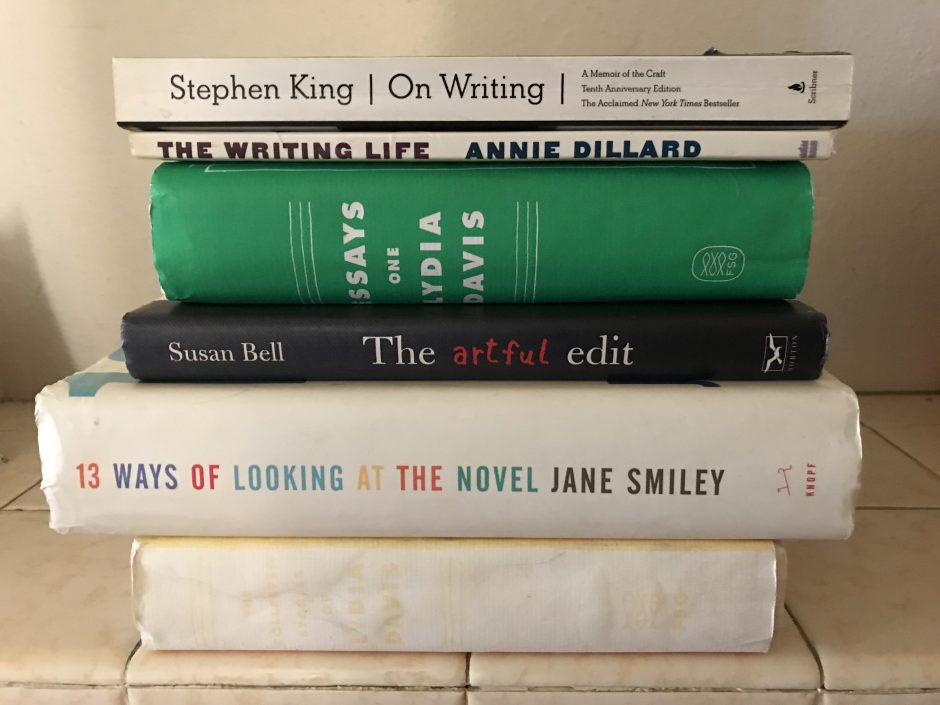Books for Writers
Though writing is solitary art, it’s also communal, and we all have favorite authors that teach and inspire us. Here’s a list of books I read often to gain deeper understanding how to write and edit my work.
The Writing Life by Annie Dillard
What is this writing life? Annie Dillard asks. “You climb a long ladder until you can see over the roof, or over the clouds. You are writing a book. You watch your shod feet step on each round rung, one at a time; you do not hurry and do not rest. Your feet feel the steep ladder’s balance; the long muscles in your thighs check its sway. You climb steadily, doing your job in the dark.” Like her celebrated work, Dillard illuminates the writing life with intelligence, humility, and great respect for the life of the artist.
Essays One by Lydia Davis
Lydia Davis creates entire universes in economical paragraphs. In this volume of essays, she takes you back to her beginnings as a writer (age twelve) and speaks on early influences: Beckett, Kafka, and in particular the poet Russell Edson. She says that Edson showed her “how you could tap some very difficult emotions and let them burst out in an unexpected, raw, sometimes absurd form—that perhaps, in fact, setting oneself absurd or impossible subjects made it easier for difficult emotions to come forth.”
From raw material to finished work, her early drafts reveal how she came to her unique style. She believes that a close analysis of the best writing, will “teach you in a useful way about writing well, not only on a conscious level but also on a subconscious or subliminal level, as the good patterns are imprinted in your brain.”
Her “Thirty Recommendations for Good Writing Habits” I refer to often. Most notably: “Always work (note, write) from your own interest, never from what you think you should be noting or writing. Trust your own interest.” Also, “Take notes regularly.”

On Writing by Stephen King
Steven King’s massive, creepy novels kept me up at night in junior high. I hadn’t read him post-Misery but On Writing instantly became one of my favorite writing books. His personal story is inspiring and he demystifies writing, settling in with the nuts and bolts of description, character, plot and the like, while honoring the importance of creating magic with your work. For him, it’s all about character, rather than plot. He describes his process as letting his protagonist run loose in an impossible situation. And, his muse is a basement guy.
The Artful Edit: On the Practice of Editing Yourself by Susan Bell
I studied with Susan Bell in graduate school and her emphasis on close reading of sentences improved my writing immeasurably. Editing is fundamental to great writing, she explains, and she shows you how to detach from your work and see it clearly, learning to edit yourself. As she says, “if writing builds the house, nothing but revisions will complete it. The writer needs to be two carpenters: a builder with mettle, and a finisher with slow hands.” She breaks down the process of macro editing (the big picture) and micro editing (the details) and includes diagnostic checklists to pinpoint what may not be working with a story or novel. Along the journey she encourages you to understand how you work and what quirks to look out for, while honoring your own voice.
13 Ways of Looking at the Novel by Jane Smiley
If you are wondering why you chose to write a novel, (or if you know why, but you’re simply stuck), try this book. Not only does it explore the technical ins-and-outs of novel writing, it offers precise, intelligent advice on how to work through self-doubt. She describes a novelist as someone “right on the cusp between someone who knows everything and someone who knows nothing” yet whose “job and ambition is to develop a theory of how it feels to be alive.” She shares her own habits and secrets of writing, providing a reassuring voice to any aspiring writer. She also includes her thoughts on the one hundred books she read when she was creatively blocked after 9/11; her insights and opinions are a delight.

Reading Like a Writer by Francine Prose
Can creative writing be taught? Prose posits that the better question is, Can the love of language be taught, or can the gift of storytelling be taught? Perhaps, she says, the real teacher for writers is books themselves. Writers learn by reading their predecessors. Prose insists on savoring books rather than racing through them, and reading slowly to understand what the writer is trying to do. Through chapters titled “Words, “Sentences,” and “Paragraphs” she examines passages in many classics as well as contemporary novels, and her insights on such beloved authors as F. Scott Fitzgerald, Gertrude Stein, Flannery O’Connor, Virginia Woolf, Philip Roth, and Paul Bowles can help anyone learn how to read like a writer.
***

Lorraine Martindale is our Editor-at-Large. She is a freelance writer and editor who loves to read and talk about books. She has an MFA from the New School in New York, and is at work on a novel about the relationships of musicians. She lives in Los Angeles with her family and two cats, Zelda and Link.



Excited to read these books!
Thank you, Jessica! I’m rereading the Jane Smiley. And I want to read so many that she recommends:)
Wonderful list for both editors and writers!
Thank you so much, Linda!